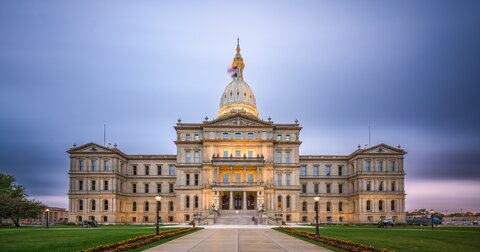Taxpayers get three small wins in $83B budget
Massive spending package moves $670M from debt payoff, but lawmakers reject bills on SOAR extension, film credits, data center tax breaks
The 2025 budget passed by the Michigan Legislature Thursday would spend $2 billion more than Gov. Whitmer requested in her own proposal, but Michigan taxpayers won three small victories amid debate that stretched until 5 a.m.
Three major bills stalled that proposed billions of dollars in handouts to private companies through film tax credits, an extension of the Strategic Outreach and Attraction Reserve, and tax breaks for data centers.
The $83 billion budget includes Senate Bill 747, the general budget, and House Bill 5507, the school budget. The package now proceeds to the governor for consideration.
One controversial funding mechanism shifts $670 million away from paying down $30 billion in retirement debt to teachers — a move lawmakers and education experts criticized.
“Democrats’ latest scheme has them pillaging public teacher’s retirement accounts to fund frivolous government expansions and unnecessary programs,” Rep. Luke Meerman, R-Coopersville, said in a statement. “The Democrats are robbing Peter to pay Paul so they can give even more taxpayer dollars to their friends and interest groups. This will create a mess for the next generation to clean up.”
Rep. Matt Koleszar, D-Plymouth, said the move away from funding teacher retirement is good for teachers.
“As a teacher and chair of the House Education Committee, I strongly support the smart and long overdue investments this bill returns to Michigan’s hard-working educators,” Koleszar said in a statement. “When our teachers succeed, our students succeed. Teachers for too long have seen a reduction in their paychecks and fewer resources in their classrooms.”
Whitmer, who is expected to sign the budget, said the plan would fix infrastructure and roads.
“We are once again setting Michigan up for success by making record investments that will benefit everyone across the state without raising taxes by a penny,” Whitmer said in a statement. “This budget will grow our economy, fix the damn roads, ensure first responders have the funding to keep our neighborhoods safe, and build a heck of a lot more affordable housing, while also bringing down costs and putting more money back in people’s pockets.”
Whitmer said the budget lowers costs by spending $100 million to construct affordable housing and $500,000 to continue the federal Electronic Benefits Transfer food program through the summer.
Lawmakers deleted at least two proposed taxes from the budget, a 1,200% increase to the landfill tipping fee rate from 36 cents to $5 per ton, which aimed to raise $80 million in revenue, and the forced purchase of a recreation pass during vehicle registration, which was expected to take another $17 million in revenue.
The education budget includes $130 million to expand publicly funded pre-K and $200 million for subsidized breakfast and lunch at Michigan public schools.
The higher education budget includes $52 million to continue Michigan Reconnect, which subsidizes tuition for adult learners 25 and older, and a $20 million increase in the Tuition Incentive Program.
The budget would spend $30 million on electric vehicle charging infrastructure, $75 million on a new Revenue Sharing Trust Fund, and $50 million on the Revitalization and Placemaking program.
The budget also includes $150 million in spending to support the reopening of the Palisades Nuclear Facility in Southwest Michigan.
Other infrastructure spending includes $509.4 million for water infrastructure and $247.6 million to improve roads, highways and bridges across the state.
Michigan Capitol Confidential is the news source produced by the Mackinac Center for Public Policy. Michigan Capitol Confidential reports with a free-market news perspective.


 Germany closes its last 3 nuclear plants
Germany closes its last 3 nuclear plants
 Michigan’s nuclear caucus urges reliable energy transition
Michigan’s nuclear caucus urges reliable energy transition
 Consumers Energy requests another rate hike one week after approval of $154 million increase
Consumers Energy requests another rate hike one week after approval of $154 million increase